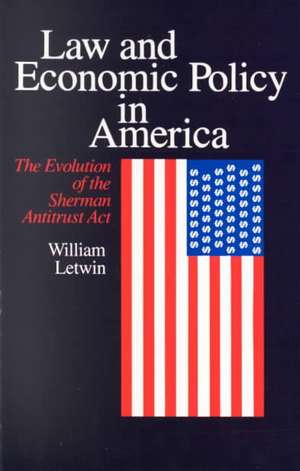Law and Economic Policy in America: The Evolution of the Sherman Antitrust Act
Autor William Letwinen Limba Engleză Paperback – 31 iul 1981
William Letwin's thorough, carefully argued, and elegantly written work is the only book length study of the Sherman Antitrust Act, a law designed to shape the economic life of a large complex society through maintaining the "correct" level of competition in the economy. This is a superb history and complete analysis of the Act, from its English and American common law antecedents to the events that led to the first revisions of the Act in the form of the Clayton Antitrust and Federal Trade Commission Acts.
Preț: 245.37 lei
Nou
Puncte Express: 368
Preț estimativ în valută:
46.97€ • 48.31$ • 38.97£
46.97€ • 48.31$ • 38.97£
Carte tipărită la comandă
Livrare economică 18 februarie-04 martie
Preluare comenzi: 021 569.72.76
Specificații
ISBN-13: 9780226473536
ISBN-10: 0226473538
Pagini: 311
Dimensiuni: 140 x 216 x 23 mm
Greutate: 0.32 kg
Ediția:Phoenix.
Editura: University of Chicago Press
Colecția University of Chicago Press
ISBN-10: 0226473538
Pagini: 311
Dimensiuni: 140 x 216 x 23 mm
Greutate: 0.32 kg
Ediția:Phoenix.
Editura: University of Chicago Press
Colecția University of Chicago Press
Notă biografică
William Letwin is chairman of the Department of Political Science at the London School of Economics and Political Science.
Cuprins
Preface
Acknowledgments
1. Introduction: Hazards of Economic Policy and of Law
Complexities of Economic Policy
Intricacies of Legal Processes
History of the Sherman Act
2. Legal Foundations of the Sherman Act
English Common Law on:
Monopolies
Forestalling, Engrossing, and Regrating
Contracts in Restraint of Trade
Combinations in Restraint of Trade
3. Passing the Sherman Act, 1888-1890
American Public Opinion on Monopolies
Expert Opinion on the Trust Problem
Economists
Lawyers
Legislative History of the Act
Law and Policy in the Act
4. Administering the Sherman Act, 1890-1901
Administrative Difficulties Facing the Attorney General
Enforcement During President Harrison's Administration
The Program of Richard Olney
Olney's attitude toward the Act
The Sugar Trust test
The Pullman strike
Olney's policy after the Pullman strike
The Policy of Attorney General Harmon
Disuse of the Act Under President McKinley
5. Interpreting the Sherman Act, 1890-1899
The Common-Law Doctrine of Early Cases
Jackson's opinion in the Greene case
Further opportunities of Jackson's rationale
The Trans-Missouri case
The Broader Interpretation of the Act in the Labor Union Cases
The first labor antitrust case
The Pullman strike litigation
Jurisdictional Problems and the Knight case
Literal Interpretation vs. the Rule of Reason: The Trans-Missouri Decision
Peckham's opinion
White's dissent
The Common Law Reconsidered: Taft's Addyston Pipe Decision
The Rule of Competition
6. The Sherman Act Reaches Maturity, 1901-1904
Formation of the Northern Securities Company
President Roosevelt's Antitrust Policy
Attorney General Knox's Strategy in the Northern Securities Case
Judicial Reasoning in the Northern Securities Case
Opinion of the circuit court
Harlan's opinion for the Supreme Court
Brewer's concurring opinion
Homes's dissent
7. Reforming the Sherman Act, 1905-1914
First Steps Toward a Regulatory System
The bureau of corporations
President Roosevelt's policy
The Hepburn bill, 1908
President Taft's policy
The Standard Oil Decision
White's rule of reason
The reception of White's opinion
The New Laws
President Wilson's policy
The Clayton Act
The Federal Trade Commission Act
8. Conclusion
Appendix: Text of the Sherman Act
Bibliography
Index
Acknowledgments
1. Introduction: Hazards of Economic Policy and of Law
Complexities of Economic Policy
Intricacies of Legal Processes
History of the Sherman Act
2. Legal Foundations of the Sherman Act
English Common Law on:
Monopolies
Forestalling, Engrossing, and Regrating
Contracts in Restraint of Trade
Combinations in Restraint of Trade
3. Passing the Sherman Act, 1888-1890
American Public Opinion on Monopolies
Expert Opinion on the Trust Problem
Economists
Lawyers
Legislative History of the Act
Law and Policy in the Act
4. Administering the Sherman Act, 1890-1901
Administrative Difficulties Facing the Attorney General
Enforcement During President Harrison's Administration
The Program of Richard Olney
Olney's attitude toward the Act
The Sugar Trust test
The Pullman strike
Olney's policy after the Pullman strike
The Policy of Attorney General Harmon
Disuse of the Act Under President McKinley
5. Interpreting the Sherman Act, 1890-1899
The Common-Law Doctrine of Early Cases
Jackson's opinion in the Greene case
Further opportunities of Jackson's rationale
The Trans-Missouri case
The Broader Interpretation of the Act in the Labor Union Cases
The first labor antitrust case
The Pullman strike litigation
Jurisdictional Problems and the Knight case
Literal Interpretation vs. the Rule of Reason: The Trans-Missouri Decision
Peckham's opinion
White's dissent
The Common Law Reconsidered: Taft's Addyston Pipe Decision
The Rule of Competition
6. The Sherman Act Reaches Maturity, 1901-1904
Formation of the Northern Securities Company
President Roosevelt's Antitrust Policy
Attorney General Knox's Strategy in the Northern Securities Case
Judicial Reasoning in the Northern Securities Case
Opinion of the circuit court
Harlan's opinion for the Supreme Court
Brewer's concurring opinion
Homes's dissent
7. Reforming the Sherman Act, 1905-1914
First Steps Toward a Regulatory System
The bureau of corporations
President Roosevelt's policy
The Hepburn bill, 1908
President Taft's policy
The Standard Oil Decision
White's rule of reason
The reception of White's opinion
The New Laws
President Wilson's policy
The Clayton Act
The Federal Trade Commission Act
8. Conclusion
Appendix: Text of the Sherman Act
Bibliography
Index
